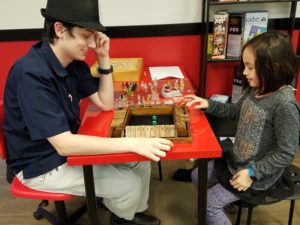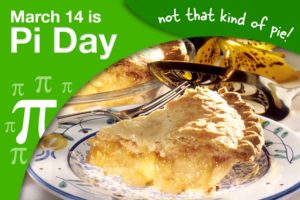Submitted by Jennifer Chevalier for Mathnasium of Olympia
At Mathnasium of Olympia, we understand that math has an unfair reputation for being a bit dull. We know that those who love math know it can be just as fascinating as any other subject out there, and our students who attend our tutoring sessions and other programs have realized how fun math can be! After years of sitting in a “boring” math class, many students have just lost interest in learning about it, but all is not lost! There are ways to rediscover its beguiling charm.

There was a time when math wasn’t frustrating. Do you remember first grade? Learning to add was fun, especially when candy was used to show how groups can be combined. To revive that child-like excitement of learning math, Mathnasium of Olympia celebrates historic mathematical truths and the people who discovered them. Math classes around the world set aside days to recognize these achievements. These fun holidays can get even the most reluctant of individuals to enjoy celebrating some of the fundamentals of math.
- e Day, February 7. While not as well-known as Pi, e is also an irrational number that occurs naturally in mathematics. Discovered by a number of mathematicians, it’s used to solve exponential and logarithmic functions. The rough numerical equivalent of e is 2.7, making the logical day to celebrate it February 7th. As to how you celebrate e Day, well, that’s up to you. You can only eat foods that start with e, read the poetry of E.E. Cummings, watch the E! Network or just do some fun math related to e.
- World Maths Day, March 1. To Americans, the plural looks funny, but it is named this way for the true global nature of the holiday. Its aim is to get people excited about math and interested in math-related jobs or fields of study. Celebrate by playing math games!
-

Pi Day is appropriately held on 3.14 and is often celebrated with some real pie as well as fun math problems involving the number. Photo courtesy: Mathnasium Pi Day, March 14. This holiday recognizes the mathematical constant of Pi, often rounded to 3.14, the date of the holiday! Pi can be celebrated by enjoying the wonders of Pi through math, watching the classic Darren Aronofsky movie Pi, eating some actual pie, or viewing some Pi-inspired art.
- Math 2.0 Day, July 8. This holiday celebrates the intersection of math and technology. Without math, we wouldn’t have much of the technology in our world like cars, computers, tv, or even buildings! It was created to bring awareness to the importance of math literacy and education. On July 8th, spend your day using math programs, attending tech lectures and appreciating the subject on the web.
- Mole Day, October 23. Mole Day celebrates Avagadro’s number (6.02×1023). This number is a basic unit of measurement in chemistry. The holiday is celebrated on October 23rd from 6:02 a.m. to 6:02 p.m. It is a celebration of puns! Use mole sauce, play whack-a-mole, and practice your mole-related jokes. The National Mole Day Foundation issues themes for each year. They haven’t yet released the 2018 theme, but the theme for 2017 was was “The MOLE-vengers.” It has also been “May the MOLES be with You,” “Molar Eclipse,” “Ride the Molercoaster,” and “Remember the Alamole.”
- Fibonacci Sequence Day, November 23. This is a math holiday that scientists and artists should celebrate. The Fibonacci Sequence is a sequence of numbers that creates a spiral. The beginning of the sequence is 1, 1, 2, 3 which is why it’s celebrated November 23. It is frequently found in nature where spirals exist (pine cone or sunflower). Celebrate by going to the beach to collect shells, taking a walk in the forest and spot spirals in nature, drawing a spiral, making a mural, or eating chocolate swirl ice cream.
About the Author
Jennifer Chevalier has been an educator for almost 30 years. She is the owner of Mathnasium of Olympia, a math learning and tutoring center, where they teach students the math they don’t know, working with students of all ages to help them catch up, keep up and get ahead.


















































